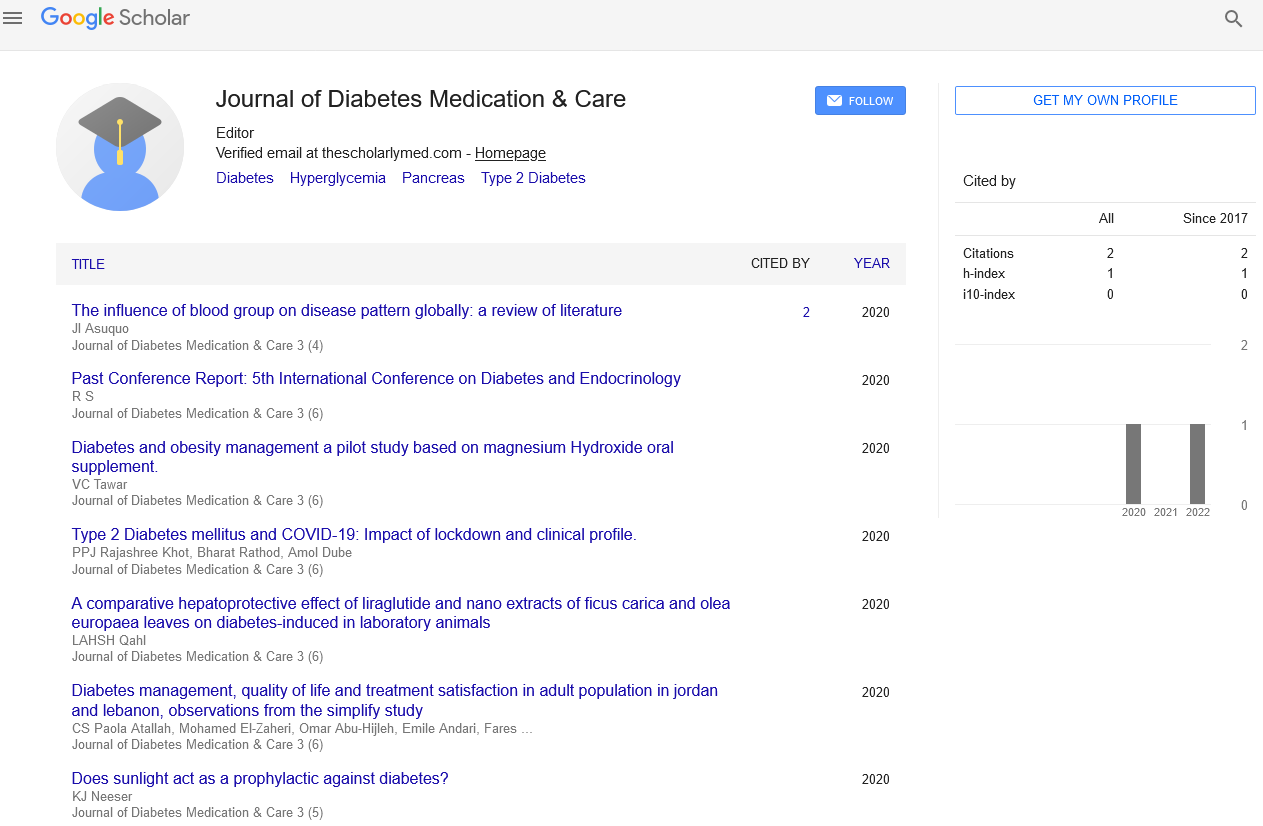Perspective - Journal of Diabetes Medication & Care (2024) Volume 7, Issue 2
Transforming Diabetes Care: The Role of Artificial Intelligence in Revolutionizing Management
- Corresponding Author:
- Yang Cheun
Department of Endocrinology, Fudan University, Shanghai, China
E-mail: cheun234@mail.edu.cn
Received: 04-Mar-2024, Manuscript No. JDMC-24-128934; Editor assigned: 07-Mar-2024, PreQC No. JDMC-24-128934 (PQ); Reviewed: 21-Mar-2024, QC No. JDMC-24-128934; Revised: 29-Mar-2024, Manuscript No. JDMC-24-128934 (R); Published: 08-Apr-2024, DOI: 10.37532/JDMC.2024.7(2).184-185
Introduction
Artificial Intelligence (AI) has emerged as a transformative force across various industries, and healthcare is no exception. In the realm of diabetes management, AI holds significant promise in improving patient outcomes, enhancing personalized care, and advancing research efforts. By leveraging vast amounts of data, sophisticated algorithms, and machine learning techniques, AI is reshaping the landscape of diabetes care, offering innovative solutions for prevention, diagnosis, treatment, and ongoing management.
Description
Understanding the diabetes challenge
Diabetes is a chronic metabolic disorder characterized by high blood sugar levels resulting from insufficient insulin production or ineffective insulin utilization. It affects millions worldwide and poses significant health risks, including cardiovascular disease, kidney failure, blindness, and nerve damage. Managing diabetes effectively requires continuous monitoring, medication management, lifestyle modifications, and personalized interventions tailored to each patient’s unique needs.
The role of artificial intelligence
Artificial intelligence is revolutionizing diabetes care by enabling more accurate prediction, early detection, personalized treatment strategies, and proactive management approaches. Here’s how AI is making a difference:
Predictive analytics: AI algorithms analyze vast datasets, including patient demographics, medical history, genetic predispositions, lifestyle factors, and environmental variables, to predict the risk of developing diabetes or complications. By identifying high risk individuals, healthcare providers can implement preventive measures and interventions to mitigate risk factors and delay disease progression.
Early diagnosis: AI-powered diagnostic tools can detect subtle patterns and anomalies in medical images, laboratory tests, and physiological data that may indicate early signs of diabetes or related complications. Through advanced imaging techniques, such as retinal scans and medical imaging, AI algorithms can detect diabetic retinopathy, neuropathy, and nephropathy at earlier stages, facilitating timely interventions and preventing irreversible damage.
Personalized treatment: AI-driven decision support systems analyze patient-specific data to recommend personalized treatment regimens, including medication dosages, dietary plans, exercise routines, and behavioral interventions. By considering individual preferences, comorbidities, genetic factors, and treatment responses, AI algorithms optimize treatment outcomes and enhance patient adherence, leading to better glycemic control and long-term health outcomes.
Continuous monitoring: Wearable devices equipped with AI algorithms enable continuous monitoring of glucose levels, physical activity, sleep patterns, and vital signs in real-time. These devices provide actionable insights and alerts to patients and healthcare providers, allowing for timely adjustments in treatment plans, early intervention during hypo or hyperglycemic episodes, and remote monitoring of patients’ progress, improving overall disease management and reducing the burden of frequent clinic visits.
Population health management: AI analytics platforms aggregate and analyze population level data to identify trends, patterns, and disparities in diabetes prevalence, risk factors, treatment outcomes, and healthcare utilization. By leveraging this information, policymakers, public health officials, and healthcare organizations can develop targeted interventions, allocate resources effectively, and implement preventive strategies to address the growing diabetes epidemic and reduce its socioeconomic impact.
Challenges and opportunities
While AI holds immense potential in transforming diabetes care, several challenges must be addressed to realize its full benefits:
Data privacy and security: Protecting patient privacy and securing sensitive health data is paramount in AI-driven healthcare systems. Robust data governance frameworks, encryption protocols, and compliance with regulatory standards are essential to safeguard patient confidentiality and prevent unauthorized access or misuse of personal health information.
Algorithm bias and interpretability: AI algorithms may exhibit bias or lack transparency in decision-making, leading to unintended consequences or disparities in care delivery. Ensuring algorithmic fairness, accountability, and interpretability is crucial to mitigate biases, enhance trustworthiness, and promote equitable healthcare outcomes for diverse patient populations.
Integration and interoperability: Seamless integration of AI technologies with existing healthcare infrastructure, Electronic Health Records (EHRs), and clinical workflows is essential for widespread adoption and scalability. Interoperability standards, data interoperability frameworks, and interoperable AI systems facilitate data exchange, interoperability, and collaboration across healthcare settings, enabling more coordinated and patient-centered care delivery.
Regulatory and ethical considerations: Regulatory oversight, ethical guidelines, and professional standards are necessary to govern the development, deployment, and use of AI in healthcare responsibly. Regulatory agencies, professional societies, and interdisciplinary stakeholders must collaborate to establish clear guidelines, ethical principles, and best practices for AI-driven healthcare innovations, ensuring patient safety, efficacy, and accountability.
Conclusion
Artificial intelligence has the potential to revolutionize diabetes care by enhancing prediction, diagnosis, treatment, and management strategies. By harnessing the power of AI algorithms, healthcare providers can deliver more personalized, proactive, and precise interventions, improving patient outcomes, reducing healthcare costs, and mitigating the burden of diabetes on individuals and society. While challenges remain, concerted efforts from policymakers, healthcare organizations, technology developers, and researchers can accelerate the adoption and integration of AI in diabetes care, paving the way for a brighter and healthier future for individuals living with diabetes.

